“It is estimated that menopausal symptoms
affect more than 75% of women,
with over 25% of women describing severe symptoms”.1
Umbrella
What may the Menopause Symptoms Umbrella include?
Depending on the Source (DotS) this Umbrella may include:
- Climacteric Changes/Signs/Symptoms
- Menopausal/Menopause Changes/Signs/Symptoms
- Menopause Transition Changes/Signs/Symptoms
- Menopause-Related Changes/Signs/Symptoms
- Perimenopausal/Perimenopause Changes/Signs/Symptoms
Hormones
What are the three main hormones that change as we approach menopause?
In What Is Menopause? Hormones and Menopause the (Australian) Jean Hailes for Women’s Health (JH) note:
- Oestrogen
- Progesterone
- Testosterone.
The change in hormone levels can lead to different menopausal symptoms”.2
Common or Not
How common are menopause symptoms?
In Symptoms of Menopause: What Are the Symptoms of Menopause? the JH explain on:
On page one in Optimising the Menopause Transition: Joint Position Statement By the British Menopause Society, Royal College of Obstetricians and Gynaecologists and Society for Endocrinology on Best Practice Recommendations for the Care of Women Experiencing the Menopause, first published online 10 June 2022, one of the recommendations is:
“It is estimated that menopausal symptoms affect more than 75% of women, with over 25% of women describing severe symptoms”.4
First Sign
What is usually the first sign of menopause?
According to the (United Kingdom) NHS:
“The first sign of the perimenopause is usually, but not always, a change in the normal pattern of your periods, for example they become irregular”.5
Physical Symptoms
What are common menopause physical symptoms?
In Menopause: Symptoms – Common Symptoms of Menopause and Perimenopause: Physical Symptoms the NHS explain:
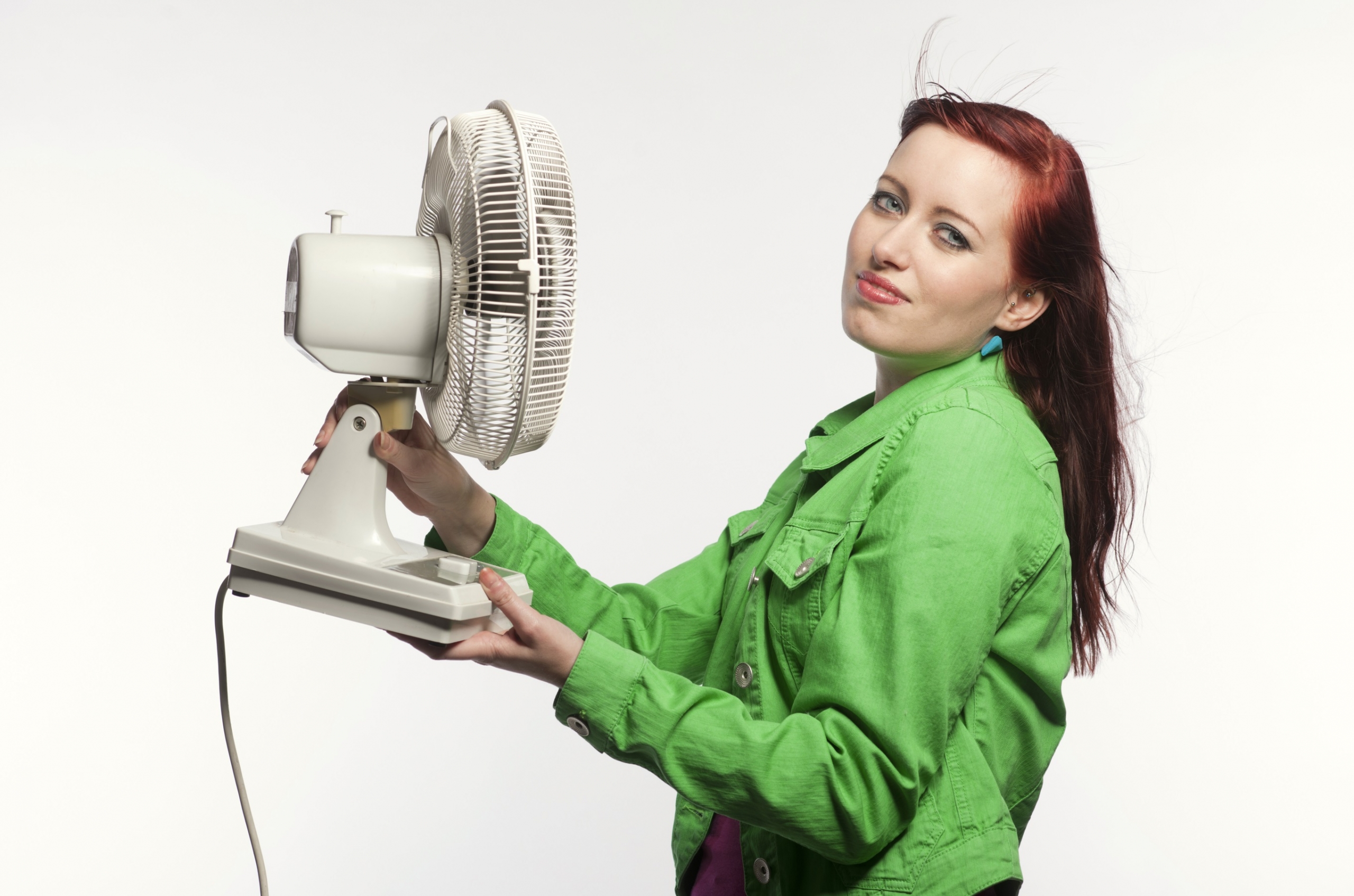 “Common physical symptoms of menopause and perimenopause include:
“Common physical symptoms of menopause and perimenopause include:
- Hot flushes, when you have sudden feelings of hot or cold in your face, neck and chest which can make you dizzy
- Difficulty sleeping, which may be a result of night sweats and make you feel tired and irritable during the day
- Palpitations, when your heartbeats suddenly become more noticeable
- Headaches and migraines that are worse than usual
- Muscle aches and joint pains
- Changed body shape and weight gain
- Skin changes including dry and itchy skin
- Reduced sex drive
- Vaginal dryness and pain, itching or discomfort during sex
- Recurrent urinary tract infections (UTIs)
- Sensitive teeth, painful gums or other mouth problems”.6
In Symptoms of Menopause: Physical and Emotional Symptoms – Physical Symptoms the JH include:
- Irregular periods
- Hot flushes
- Night sweats
- Sleep problems
- Sore breasts
- Itchy, crawly or dry skin
- Exhaustion and fatigue
- Dry vagina
- Loss of sex drive (low libido)
- Headaches or migraines
- More pronounced premenstrual syndrome (PMS)
- Aches and pains
- Bloating
- Urinary problems
- Weight gain due to a slower metabolism”.7
Psychological Symptoms
What are common menopause psychological symptoms?
In Symptoms of Menopause: Physical and Emotional Symptoms – Psychological and Emotional Symptoms the JH include:
- Feeling irritable or frustrated
- Feeling anxious
- Difficulty concentrating
- Brain fog
- Forgetfulness
- Lowered mood
- Mood swings
- Feeling you can’t cope as well as you used to”.8
Difference Differences
Are menopause symptoms one-size-fits-all?
No. In Symptoms of Menopause the JH elaborate on:
“Menopause can cause a range of physical and emotional changes, such as hot flushes, vaginal changes and mood swings. Every woman will have a different experience”.9
Duration
How long can menopause symptoms last?
In What Is Menopause? What Is Perimenopause (The Menopausal Transition) the Australasian Menopause Society (AMS) explain:
The JH note:
In Menopause: Symptoms – How Long Symptoms Last the NHS note:
For example, hot flushes and night sweats may improve, and then you may develop low mood and anxiety.
Some symptoms, such as joint pain and vaginal dryness, can carry on after your periods stop”.12
Factors
What factors impact on menopause symptoms?
The JH explain:
“Menopausal symptoms can be influenced by different things. For example, your stage of life and general health and wellbeing”.13
Conditions
What are the most common conditions that may mimic menopause symptoms?
Yes. In Diagnosing Menopause: If It’s Not Menopause, What Is It? the AMS elaborate on:
“Depression, anaemia and thyroid disorders are the most common conditions that may occur concurrently. Unstable diabetes and hyperthyroidism may cause hot flushes. Medication, such as the SSRI family of anti-depressants, may also cause hot flushes”.14
Lifestyle
Is there an association between lifestyle and menopause symptoms?
Yes. In Looking After Yourself the JH elaborate on:
On page one in Joint Position Statement By the British Menopause Society, Royal College of Obstetricians and Gynaecologists and Society for Endocrinology on Best Practice Recommendations for the Care of Women Experiencing the Menopause one of the recommendations is:

- “Women should be advised that implementing or maintaining a healthy lifestyle can improve menopause symptoms. A healthy diet (one low in saturated fat and salt and rich in calcium and vitamin D), stopping smoking, reducing alcohol intake and including regular exercise can be beneficial. Reducing caffeine intake may also improve symptoms”.16
Lifestyle Tips
What are some lifestyle tips which may relieve menopause symptoms?
In Menopause: Diagnosis & Treatment – Lifestyle and Home Remedies the (United States) Mayo Clinic elaborate on:
- Cool hot flashes…
- Decrease vaginal discomfort…
- Get enough sleep…
- Practice relaxation techniques…
- Strengthen your pelvic floor…
- Eat a balanced diet…
- Don’t smoke…
- Exercise regularly…”.17
Hormone Therapy
How effective is hormone therapy (HT) for the treatment of menopause symptoms?
On page one in Deciding About Hormone Therapy Use: Potential Benefits, published July 2022, the NAMS explain:
Health Care Provider
What if I would like help with menopause symptoms?
If you would like help with menopause symptoms, it may be in your best interest to choose to talk to your health care provider about this.
In What Is Menopause? When To See Your Doctor the JH also note:
- Irregular periods
- Heavy bleeding
- Bleeding after menopause
- Increased premenstrual syndrome (PMS) symptoms
- Menopausal symptoms, such as hot flushes, that interfere with your daily life”.19
In Menopause: Diagnosis & Treatment – Treatment the Mayo Clinic explain:
“Before deciding on any form of treatment, talk with your doctor about your options and the risks and benefits involved with each. Review your options yearly, as your needs and treatment options may change”.20
Health Topics A-Z
Where may I find Health Topics A-Z related to Menopause Symptoms?
In Health Topics A-Z you may find:
Links
Where may I find Links related to Menopause Symptoms?
Your Country may have Links similar to:
Links
This Links List to third party websites is neither comprehensive nor exhaustive. Inclusion on this Links List does not imply endorsement or recommendation. Non-inclusion on this Links List does not imply non-endorsement or non-recommendation. Third party websites are not under the control of Meno Martha International Menopause Directory. Third party websites may contain explicit medical images and/or sexual references. Please read Meno Martha International Menopause Directory’s Links Policy before proceeding to a Link. Please contact Webmaster if you experience a problem with a Link.New or Updated
- How To Manage Menopausal Insomnia [04 July 2024]
- Mayo Clinic Minute: Perimenopause and Menopause [13 May 2024] [+ Video Courtesy: Mayo Clinic News Network]
- Menopause and HRT: Fact and Fiction [31 May 2024]
- Surprising Menopause Symptoms Revisited | Dr Louise Newson [25 June 2024]
- Video Series-2024: Preparing for Your Menopause Health Care Visit [13 January 2024]
- Videos & Podcasts: Videos – Interviews: Metabolic Syndrome in Midlife Women [April 2024]
- Webinars: Previous – Non-Pharmacological Interventions For VMS
- ACOG Explains: Managing Menopause Symptoms [American College of Obstetricians and Gynecologists] [October 2023]
- AMS Symptom Score Card
- Askearlymenopause.org [Ask EM] [+ Video: What Is Early Menopause?]
- BMS Statement on Testosterone
- BMS TV: Menopause Explained
- Bioidentical Hormones: Are They Safer?
- CAMS Menopause Hour: A Practical Approach To the Management of Menopause [28 March 2024] [Council of Affiliated Menopause Societies]
- Cognitive Behaviour Therapy (CBT) for Menopausal Symptoms
- Compounded Bioidentical Hormone Therapy [Video]
- Deciding About Hormone Therapy Use
- Does Having Hot Flashes Mean I’ve Started Menopause?
- Dr Louise Newson: The Truth About the Menopause & HRT
- EMAS On-Demand Webinars [European Menopause and Andropause Society] [Multiply Languages]: Benefits of Oral Combined MHT for Estrogen Deficiency Symptoms Treatment (EN)
- Find A Menopause Practitioner [United States and Other]
- Find An AMS Doctor [Australasian Menopause Society i.e. Australia and New Zealand]
- Find Your Nearest BMS Menopause Specialist [British Menopause Society]
- Hormone Therapy: Four Things A Mayo Clinic Women’s Health Specialist Wants You To Know [+ Video Courtesy: Mayo Clinic News Network. Name Super/CG: Taryn Smith, M.D./Internal Medicine/Mayo Clinic]
- Hot Flashes
- Hot Flashes: What Can I Do? [+ Video: What Are the Signs and Symptoms of Menopause?]
- How To Manage Menopausal Insomnia
- How To Talk To Your Doctor About Midlife Brain Fog
- Is Menopause Making Me Put on Weight? No, But It’s Complicated
- Joint Position Statement By the British Menopause Society, Royal College of Obstetricians and Gynaecologists and Society for Endocrinology on Best Practice Recommendations for the Care of Women Experiencing the Menopause
- Later Years (Around 50 Years and Over): Menopause and Post Menopause Health – Menopause [+ Video: Menopause]
- Later Years (Around 50 Years and Over): Menopause and Post Menopause Health – Menopause and Your Mental Wellbeing [+ Video: Menopause Only Affects You Physically!]
- Later Years (Around 50 Years and Over): Menopause and Post Menopause Health – Signs and Symptoms of Menopause [+ Video: Talking Menopause With Your GP]
- Let’s Talk About Perimenopause
- Management of Perimenopausal and Menopausal Symptoms
- Mastering Midlife Mood Changes With Marlene Freeman, MD
- Mayo Clinic Minute: Help With Hot Flashes Due To Menopause [+ Video Courtesy: Mayo Clinic News Network]
- Mayo Clinic Minute: How Lifestyle Changes May Help Manage Menopause Symptoms [+ Video]
- Mayo Clinic Minute: Perimenopause and Menopause
- Mayo Clinic Q and A: Perimenopause Transitions and Concerns
- Menopause
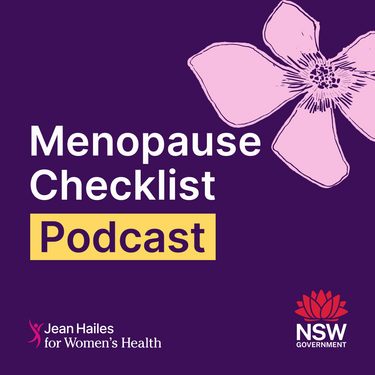 Menopause
Menopause- Menopause
- Menopause Checklist Podcast
- Menopause Management Options
- Menopause Map: Downloadable Resources – My Personal Path Print Tools: Questions for Your Health Care Provider

- Menopause Map: Downloadable Resources – My Personal Path Print Tools: Symptom Tracker
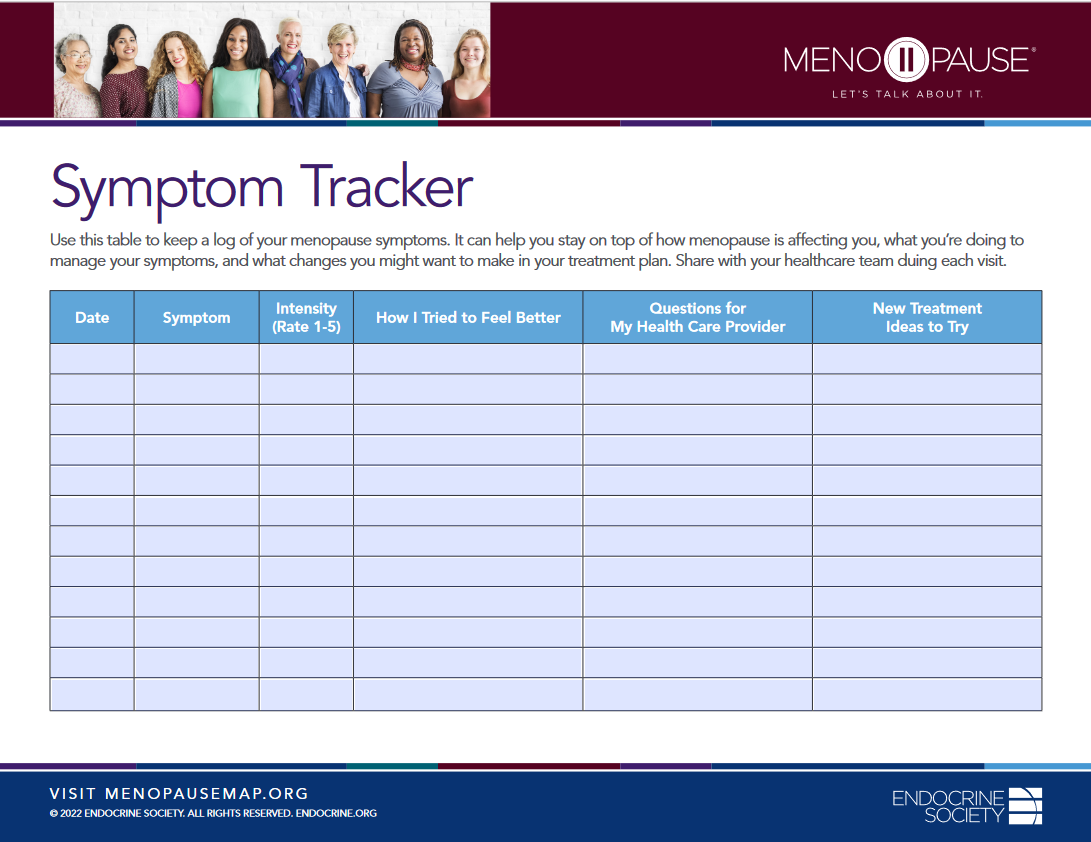
- Menopause Mindfulness: A Personal Toolkit for Menopause Preparedness
- Menopause Patient Information [Videos] 2. Talking To Your GP About Menopause
- Menopause Patient Information [Videos] 5. Lifestyle Advice In Menopause & Perimenopause
- Menopause Preparedness Toolkit Video Series: Understanding Menstrual Health and Menopause
- Menopause Preparedness Toolkit Video Series: Treating Vasomotor Symptoms of Menopause
- Menopause Preparedness Toolkit: A Woman’s Empowerment Guide
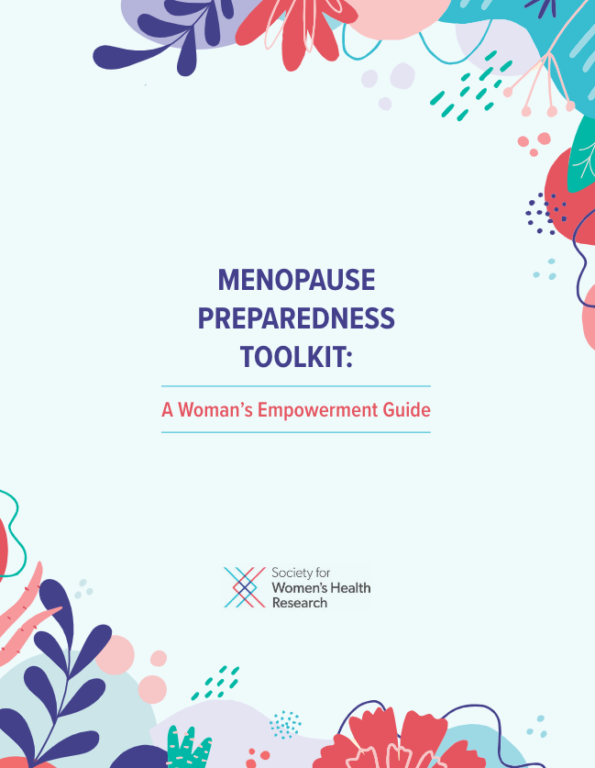
- Menopause Signs and Symptoms
- Menopause Symptoms
- Menopause Symptoms: Mayo Clinic Expert Outlines Hormone and Nonhormonal Therapies
- Menopause Treatments: What Works, What Doesn’t
- Menopause and HRT: Fact and Fiction
- Menopause and Mental Health
- Menopause, Perimenopause, Hormone Therapy and Other Treatments With Madelyn Butler, MD [Podcast]
- Menopause: Symptoms
- Menopause: Symptoms & Causes
- Menopause: Symptoms & Risk Factors
- Menopause: Understanding the Changes and Finding Relief | Dr Susan Davis | The Proof Podcast EP 256
- Mood and the Menopause
- My Periods Have Changed. Is Menopause Around the Corner?
- National Center for Complementary and Integrative Health: Herbs At A Glance
- National Center for Complementary and Integrative Health: How Safe Is This Product or Practice?
- Navigating Menopause: Expert Insights and Solutions | Dr Susan Davis | The Proof Podcast EP 245
- Navigating Menopause: Honest Answers To All Your Questions [+ Video: What To Expect in Menopause]
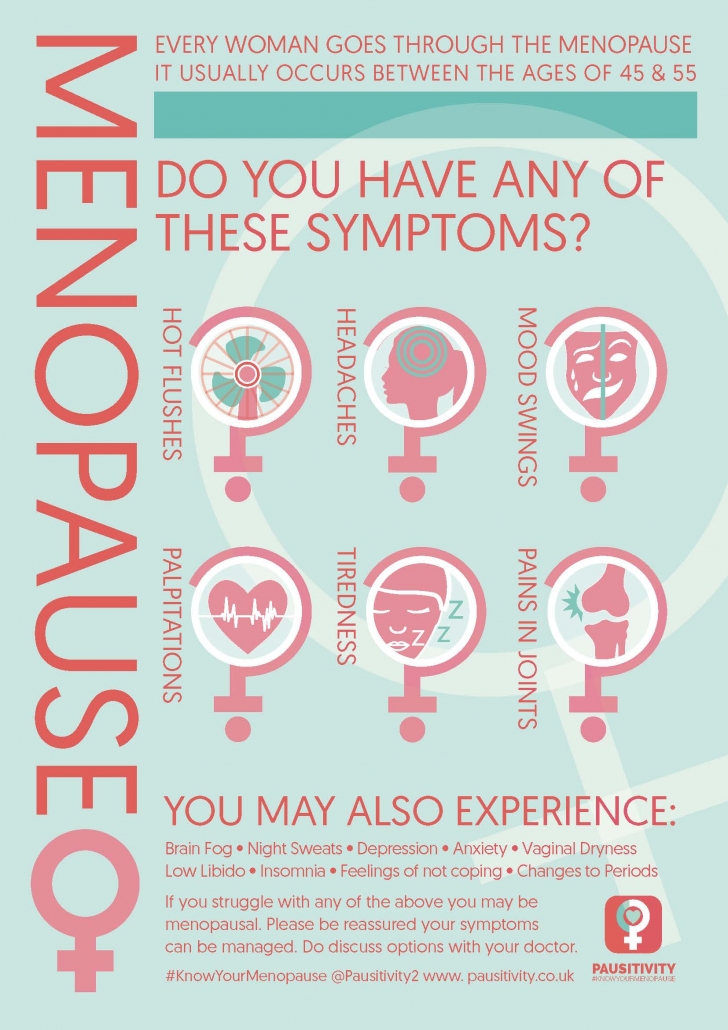 Night Sweats
Night Sweats- Non-Estrogen Treatments for Menopausal Symptoms
- Nonhormone Treatments for Hot Flashes and Night Sweats
- Pausitivity – #KnowYourMenopause Poster Campaign: Menopause Do You Have Any of These Symptoms? [Multiply Languages]
- Perimenopause
- Perimenopause
- Perimenopause and Menopause Symptom Checklist

- Perimenopause: Rocky Road To Menopause
- Periods Information Hub
- Supporting A Loved One Through Menopause
- Surprising Menopause Symptoms Revisited | Dr Louise Newson
- Symptoms of Menopause
- Symptoms of Menopause: What Are the Symptoms of Menopause?
- The 2023 Practitioner’s Toolkit for Managing Menopause: Management
- The Lancet: Series From the Lancet Journal – Menopause 2024
- The Reality of Menopause Weight Gain
- The Truth About Menopause Supplements | Dr Sarah Berry
- Tips To Help Manage Menopause Symptoms
- Vaginal Dryness
- Vaginal Dryness: What To Do About It
- Video Series-2023: NAMS 2023 Nonhormone Therapies Position Statement for Bothersome Menopause Symptoms
- Video Series-2023: New FDA-Approved Nonhormone Option for the Treatment of Hot Flashes
- Video Series-2023: Premature and Early Menopause
- Video Series-2023: Racial and Ethnic Differences In the Menopause Experience
- Video Series-2024: Preparing for Your Menopause Health Care Visit
- Video: Researchers Emphasize Normalization of Menopause
- Videos & Podcasts: Videos – Interviews: Metabolic Syndrome in Midlife Women
- Videos & Podcasts: Videos – Interviews: Preventing Bone Loss At Menopause
- Videos and Podcasts: Videos – Interviews: A Simple Approach To Menopause: The Menopause Quick Six (www.MQ6.ca)
- Webinars: Previous – Non-Hormonal Pharmacological Interventions For VMS
- Webinars: Previous – Non-Pharmacological Interventions For VMS
- What Everyone Should Know About Menopause Symptoms
- What Is Menopause?
- What Is Menopause?
- What Is Menopause? [Video]
- What To Expect In Menopause
- Why Didn’t Anyone Tell Me This? Episode 3: Dr Annice Mukherjee: Your Essential Menopause Toolkit
Source
Where may I find the Sources quoted?
You may find the Sources quoted at:
Sources
- Hamoda, H., Mukherjee, A., Morris, E., Baldeweg, S. E., Jayasena, C. N., Briggs, P., Moger, S. Optimising the Menopause Transition: Joint Position Statement By the British Menopause Society, Royal College of Obstetricians and Gynaecologists and Society for Endocrinology on Best Practice Recommendations for the Care of Women Experiencing the Menopause. First Published Online 10 June 2022:1 https://journals.sagepub.com/doi/10.1177/20533691221104882 Accessed: 18 April 2024
- What Is Menopause? Hormones and Menopause. Last Updated: 18 January 2024 | Last Reviewed: 19 August 2022. Jean Hailes for Women’s Health https://www.jeanhailes.org.au/health-a-z/menopause/about-menopause Accessed: 18 April 2024
- Symptoms of Menopause. Last Updated: 28 March 2024 | Last Reviewed: 19 August 2022. Jean Hailes for Women’s Health https://www.jeanhailes.org.au/health-a-z/menopause/menopause-symptoms Accessed: 18 April 2024
- Hamoda, H., Mukherjee, A., Morris, E., Baldeweg, S. E., Jayasena, C. N., Briggs, P., Moger, S. Optimising the Menopause Transition: Joint Position Statement By the British Menopause Society, Royal College of Obstetricians and Gynaecologists and Society for Endocrinology on Best Practice Recommendations for the Care of Women Experiencing the Menopause. First Published Online 10 June 2022:1 https://journals.sagepub.com/doi/10.1177/20533691221104882 Accessed: 18 April 2024
- Menopause: Symptoms – Common Symptoms of Menopause and Perimenopause: Changes To Your Periods. Page Last Reviewed: 17 May 2022. NHS https://www.nhs.uk/conditions/menopause/symptoms/#changes-to-your-periods Accessed: 18 April 2024
- Menopause: Symptoms – Common Symptoms of Menopause and Perimenopause: Physical Symptoms. Page Last Reviewed: 17 May 2022. NHS https://www.nhs.uk/conditions/menopause/symptoms/#changes-to-your-periods Accessed: 18 April 2024
- Symptoms of Menopause. Physical and Emotional Symptoms – Physical Symptoms. Last Updated: 28 March 2024 | Last Reviewed: 19 August 2022. Jean Hailes for Women’s Health https://www.jeanhailes.org.au/health-a-z/menopause/menopause-symptoms Accessed: 18 April 2024
- Symptoms of Menopause. Physical and Emotional Symptoms – Psychological and Emotional Symptoms. Last Updated: 28 March 2024 | Last Reviewed: 19 August 2022. Jean Hailes for Women’s Health https://www.jeanhailes.org.au/health-a-z/menopause/menopause-symptoms Accessed: 18 April 2024
- Symptoms of Menopause. Last Updated: 28 March 2024 | Last Reviewed: 19 August 2022. Jean Hailes for Women’s Health https://www.jeanhailes.org.au/health-a-z/menopause/menopause-symptoms Accessed: 18 April 2024
- What Is Menopause? Key Points. Content Created May 2022. Australasian Menopause Society https://www.menopause.org.au/hp/information-sheets/185-what-is-menopause Accessed: 18 April 2024
- Menopause Management Options: Menopausal Hormone Therapy (MHT) – How Long Do You Need To Take MHT? Last Updated: 19 December 2023 | Last Reviewed: 19 August 2022. Jean Hailes for Women’s Health https://www.jeanhailes.org.au/health-a-z/menopause/menopause-management Accessed: 18 April 2024
- Menopause: Symptoms – How Long Symptoms Last. Page Last Reviewed: 17 May 2022. NHS https://www.nhs.uk/conditions/menopause/symptoms/#changes-to-your-periods Accessed: 18 April 2024
- Symptoms of Menopause. Last Updated: 28 March 2024 | Last Reviewed: 19 August 2022. Jean Hailes for Women’s Health https://www.jeanhailes.org.au/health-a-z/menopause/menopause-symptoms Accessed: 18 April 2024
- Diagnosing Menopause: If It’s Not Menopause, What Is It? Content Created May 2022. Australasian Menopause Society https://www.menopause.org.au/hp/gp-hp-resources/300-diagnosing-menopause Accessed: 18 April 2024
- Looking After Yourself. Last Updated: 19 January 2024 | Last Reviewed: 19 August 2022. Jean Hailes for Women’s Health https://www.jeanhailes.org.au/health-a-z/menopause/looking-after-yourself Accessed: 18 April 2024
- Hamoda, H, Mukherjee, A, Morris, E, Baldeweg, S. E., Jayasena, C. N., Briggs, P, Moger, S. Joint Position Statement By the British Menopause Society, Royal College of Obstetricians and Gynaecologists and Society for Endocrinology on Best Practice Recommendations for the Care of Women Experiencing the Menopause. First Published Online 10 June 2022 https://journals.sagepub.com/doi/full/10.1177/20533691221104879 Accessed: 18 April 2024
- Menopause: Diagnosis & Treatment – Lifestyle and Home Remedies. 25 May 2023. Mayo Clinic https://www.mayoclinic.org/diseases-conditions/menopause/diagnosis-treatment/drc-20353401 Accessed: 18 April 2024
- Deciding About Hormone Therapy Use: Potential Benefits. 2022:1. North American Menopause Society https://www.menopause.org/docs/default-source/professional/menonote-deciding-about-ht-2022.pdf Accessed: 18 April 2024
- What Is Menopause? When To See Your Doctor. Last Updated: 18 January 2024 | Last Reviewed: 19 August 2022. Jean Hailes for Women’s Health https://www.jeanhailes.org.au/health-a-z/menopause/about-menopause#when-to-see-your-doctor Accessed: 18 April 2024
- Menopause: Diagnosis & Treatment – Treatment. 25 May 2023. Mayo Clinic https://www.mayoclinic.org/diseases-conditions/menopause/diagnosis-treatment/drc-20353401 Accessed: 18 April 2024



